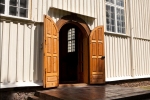April 12, 2011
Where are the Young Adults?
 Maybe it was the lemon cake, but by the end of Friday’s dinner at Julian House in Chicago the constant hand wringing about young adults and the future of the Episcopal Church seemed a distant memory. Where are young adults in the Episcopal Church? For a moment at least, eleven of us were seated around a dining room table eating delicious food and discussing the exciting new ways many young adults are partnering for peace, social justice, and discernment.
Maybe it was the lemon cake, but by the end of Friday’s dinner at Julian House in Chicago the constant hand wringing about young adults and the future of the Episcopal Church seemed a distant memory. Where are young adults in the Episcopal Church? For a moment at least, eleven of us were seated around a dining room table eating delicious food and discussing the exciting new ways many young adults are partnering for peace, social justice, and discernment.
With Peter Drucker’s insights in mind, here are two “unexpected successes” to consider when discussing the role of young adults in the Episcopal Church: Episcopal Peace Fellowship’s Urban/Rural Pilgrimages and Episcopal Service Corps’ network of service internships. Both are growing, both are being led by and engage young adults, and both are equipping folks to go out and beyond the red doors in service, on behalf of social justice, and grounded in faith.
If you know of a young adult who might be interested in spending a week or a year exploring these issues, please share these opportunities with them.
When Nicole Janelle, Jessie Smith and I crossed the threshold of the Episcopal Service Corp’s Julian House in Chicago, we were met with both welcome and surprise. Having been told that three Episcopal Peace Fellowship board members were coming to have dinner with them, the eight interns at Julian House didn’t expect three young adults! (Since 2004, EPF has made a concerted effort to bring young adults into the highest level of organizational leadership. There are now 9 people under forty serving on the 18 member board, a fact that has led to a renewed focus on forming the next generation of young adult leaders.)
Nicole, Jessie and I were there to discuss EPF’s urban & rural pilgrimages, opportunities in which young adults from across the country gather for weeklong journeys to “reflect spiritually, theologically and politically on the societal causes of homelessness, immigration and hunger.” This year's pilgrimages took place in Austin, TX, New York, NY and Oxnard, CA. The Austin pilgrimage focused on homelessness and immigration, the New York on homelessness and housing, and the Oxnard pilgrimage focused on workers’ rights and food justice. All three are intentionally called “pilgrimages” because they are aimed at the transformation of participants - a process richly described on the blog they kept of their journeys.
Although this program is relatively new, it is growing by leaps and bounds. There are plans for additional sites next year, with a few of this year’s participants excited about serving as future pilgrimage guides.
Episcopal Service Corps
But back to the dinner itself. Nicole, Jessie and I had come to meet with the members of Julian house, one Episcopal Service Corps program in Chicago, to explore ways we might partner with this rapidly growing initiative.
In the following Episcopal Life Online article, the director of the ESC board noted that this initiative was aimed as a third chapter of formation after youth and college chaplaincies. “The hope is to develop the ESC to such a degree that young people growing up in the Episcopal Church will be aware of it and think of doing it as a year after college.” There are presently 17 locations where young adults are taking a year to “live in intentional community with a simple, sustainable lifestyle; work for social justice; deepen spiritual awareness and discern vocation; and develop leadership within the paradigm of servant leadership.”
And for a denomination that regularly laments our lack young adults, it's vital to note the competition to get into these programs is intense. About a week ago, Amity Carrubba, the new director of the Episcopal Service Corps, posted on ESC’s Facebook page - “As of today, the Episcopal Service Corps has received 199 applications for the 2011-2012 service year!” This means that in many cases there will be more than 100 applicants competing for just a few slots at each site. (The Chicago Julian Year has eight interns; the New York Intern program has had five.)
In this sense, we were seated among the lucky ones at Julian House. And while we did make it a point to talk about how the urban/rural pilgrimages and Episcopal Service Corps might partner, we also simply enjoyed the experience of getting to know one another. We chatted about service sites, karaoke, and what we were discerning for our futures.So where are the young adults? Some are in our churches and we should do everything in our power to welcome more in. But I’m finding that many are out in the world, practicing the connection between faith and justice, serving their neighbors beyond the red doors. This is good news if our primary concern is about forming the next generation of church leadership. It’s more difficult if our primary concern is about bums in the pews. The questions I’m now wrestling with is how to focus more time and energy on the former and not be too wrapped up in worrying about the latter. I’d love to hear your thoughts.





